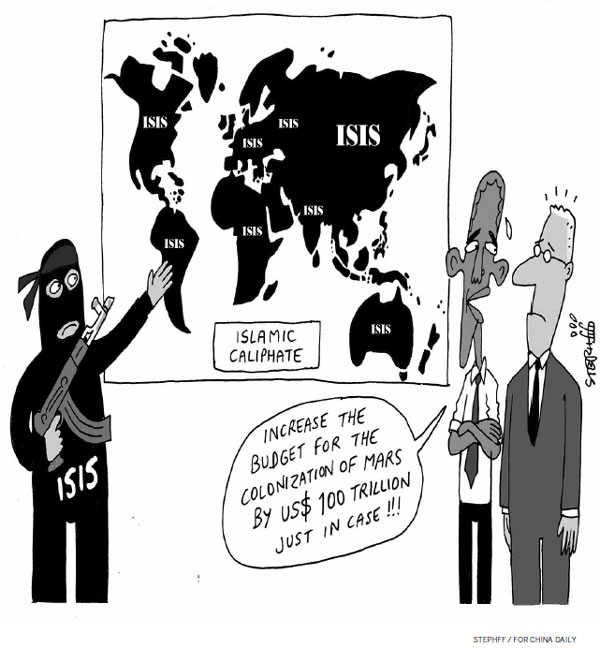Islamic State a threat to the world
It would be imprecise to refer to the terrorist "regime" led by its self-proclaimed Khalifah "Abu Bakr al-Baghdadi" as the Islamic State of Iraq and the Levant (ISIS). In June the dreaded leader removed the geographical restriction of his "state", replacing it with just "Islamic State" and commanding Muslims across the world to pledge loyalty to the new "ISIS".
The cold-blooded Islamic State jihadists released a video on Wednesday showing the beheading of a man, resembling freelance American journalist James Foley, who was kidnapped in Syria two years ago. At the end of the video footage, the jihadists threaten to kill another American journalist if the US-led strikes against them don't stop.
Although al-Qaida led by Osama bin Laden, who was killed in a US strike in 2011, claimed to lead the Islamic "war against the US", the outfit didn't receive much assistance from the Muslim world. Neither Shi'ite Iran and Syria, which the US considers its "real enemies", nor Sunni-led Muslim countries, showed much support for al-Qaida. As a result, its leaders spent most of their days hiding in places ranging from East Africa to Afghanistan before bin Laden's death.
But "ISIS" which grew out of al-Qaida holds a massive amount of land in northern Iraq and eastern Syria, and even neighboring Jordan and Lebanon feel threatened because the outfit's fanatic activists could cross over their borders anytime.
Would bin Laden, had he been alive, be delighted by the development? Not at all. To begin with, IS leader Abu Du'a has called upon Muslims to smash the Black Stone in the eastern corner of Kaaba, the cuboid building which is the most sacred point in Islam and to which all Muslims turn while praying. By discrediting the sacredness of the Black Stone, he has violated one of the most fundamental creeds of Islam.
Despite the resemblance and connection between the IS and al-Qaida (both are Sunni outfits), the former should not be seen merely as an "updated version" of the latter, especially because of the military conflict between the two in Syria. IS members have butchered not only unarmed civilians, but also their comrades-in-arms. The motivation is brutally simple: there can only be one leader of Islamic extremists in the world.
Intrinsically, the clash between these two groups of Islamic extremists is a struggle for power. But the IS and al-Qaida are fighting for something more than power, because their approach to expanding extremism differs.
Since al-Qaida accords top priority to the "war against the US", disputes between/among religious sects were never its major concern. Al-Qaida's new leader Ayman al-Zawahri has even asked followers to avoid unnecessary clashes with other Muslim sects in order to protect the organization's "image" and save its limited resources. What al-Qaida has focused on is targeting US "agents" in Middle East and South Asia, namely the puppet governments such as the one led by Nouri al-Maliki in Iraq.
In contrast, expansion has been the driving force of the "ISIS" right since its birth. Apart from the Nouri al-Maliki government, which ironically is the least favorite of Washington, the Bashar al-Assad government in Syria, which is a real US "enemy", appeared to be the major target of most IS-led terrorist attacks. Even more absurd is the IS' brutal onslaught on Iraqi Yazidis, a Kurdish ethnic group which has nothing to do with the US-led Middle East order.
All this shows that the IS is hell-bent on redrawing the geopolitical map of the Middle East and creating a caliphate based on "pure Islam" in the region and beyond under the pretext of "war against the US".
Such "aspirations", if religious persecution can be called so, will serve as a magnet for terrorists and Islamic mercenaries across the globe. Compared with the al-Qaida's unrealizable "goal" of "defeating" Washington, the "aspirations" of the IS, built on the blood and suffering of innocents, seem within easier reach. That is why a number of Western extremists have preferred to join the ruthless IS rather than the al-Qaida.
To put it bluntly, members of al-Qaida are sheer terrorists, while those of the IS are a mix of terrorists, thugs, bandits and career mercenaries. So those living under the delusion that they are immune to "IS"-related troubles by assuming that the outfit is other countries' problem are simply kidding themselves. No place will be safe from the IS if countries across the world don't come together to end the menace.
The author is a researcher of the South Asian studies under the Chinese Academy of Social Sciences.



















